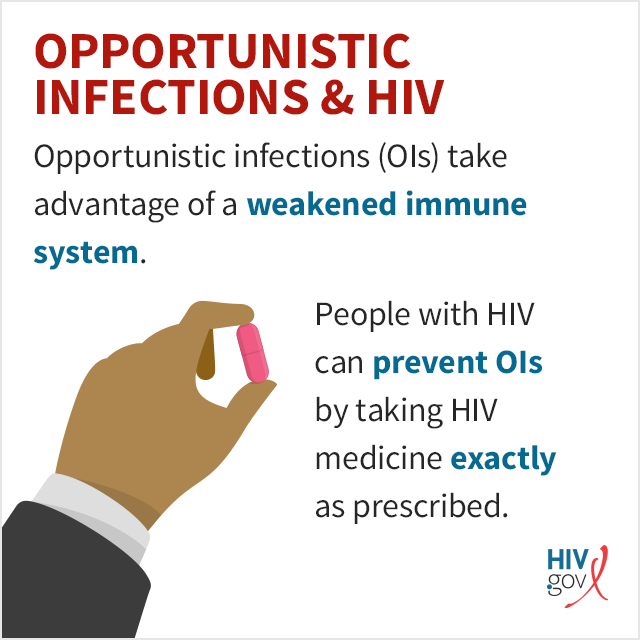Opportunistic Infections

What Are Opportunistic Infections?
Opportunistic infections (OIs) are infections that occur more frequently and are more severe in people with weakened immune systems, including people with HIV.
Many OIs are considered AIDS-defining conditions. That means if a person with HIV has one of these conditions, they are diagnosed with AIDS, the most serious stage of HIV infection, regardless of their CD4 cell count.
OIs are less common now than they were in the early days of HIV and AIDS when there was no treatment. Today’s HIV medicines (called antiretroviral therapy or ART) reduce the amount of HIV in a person’s body and keep the immune system stronger and better able to fight off infections.
However, some people with HIV still develop OIs for reasons such as:
- they do not know they have HIV and so they are not on treatment
- they know they have HIV but are not taking ART or are not taking it regularly
- they had HIV for a long time before they were diagnosed and so have a weakened immune system
- they are taking ART, but they have not yet achieved viral suppression
What Are Some of the Most Common Opportunistic Infections?
Some of the most common OIs in people with HIV are:
- Herpes simplex virus 1 (HSV-1) infection— a viral infection that can cause eye inflammation, mouth and throat disease, genital herpes, and brain infections. It can also affect the prostate of men who have sex with men (MSM ).
- Salmonella infection—a bacterial infection that affects the intestines
- Candidiasis (thrush)—a fungal infection of the mouth, bronchi, trachea, lungs, esophagus, or vagina
- Toxoplasmosis—a parasitic infection that can affect the brain
- Pneumocystis pneumonia (PCP)—a lung infection caused by a fungus (Pneumocystitis jirovecii)
- Tuberculosis—a bacterial infection that affects the lungs and can also affect other parts of the body such as the kidneys, brain, skin, lymph nodes, and eyes.
Visit CDC for a detailed list.
What Causes Opportunistic Infections?
OIs are caused by a variety of germs (viruses, bacteria, fungi, and parasites). These germs spread in different ways, such as in the air, in body fluids, or in contaminated food or water. They can cause health problems when a person’s immune system is weakened by HIV disease.
Who Is at Risk for Opportunistic Infections?
People with HIV are at greatest risk for OIs when the count of their infection-fighting CD4 cells falls below 200. However, some OIs can occur when a person’s CD4 count is below 500. That’s because weakened immune system makes it harder for the body to fight off HIV-related OIs. (Read more about CD4 count tests on HIV.gov’s Lab Tests and Results page.)
How Can You Prevent Getting Opportunistic Infections?

If you have HIV, the best thing you can do to stay healthy and prevent OIs is to take ART exactly as prescribed and get and keep an undetectable viral load—a level of HIV in your blood so low that a standard lab test can’t detect it.
It is also important to stay in HIV medical care and get lab tests done. This will allow you and your health care provider to know when you might be at risk for OIs and discuss ways to prevent them.
Some of the ways people with HIV can reduce their risk of getting an OI include:
- avoiding exposure to contaminated water and food
- taking medicines to prevent certain OIs if your CD4 count is below 200
- getting vaccinated against some preventable infections
- traveling safely
- avoiding cat litter
Can Opportunistic Infections Be Treated?
If you develop an OI, there are treatments available such as antiviral, antibiotic, and antifungal drugs. The type of medicine your health care provider prescribes will depend on the OI.
Once an OI is successfully treated, a person may continue to use the same medicine or an additional medicine to prevent the OI from coming back. Having an OI may be a very serious medical situation and its treatment can be challenging.
For detailed information about specific OIs, see the Guidelines for the Prevention and Treatment of Opportunistic Infections in Adults and Adolescents with HIV.